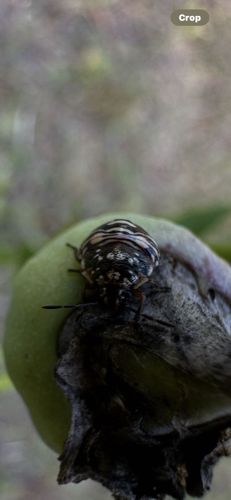Brown Marmorated Stink Bug
Scientific Name: Halyomorpha halys
Order & Family: Hemiptera, Pentatomidae
Size: Approximately 1.2 - 1.7 cm (0.5 - 0.7 inches) in length.

Natural Habitat
Agricultural fields, orchards, gardens, and urban/suburban environments; known to overwinter in homes and other structures.
Diet & Feeding
Polyphagous, meaning it feeds on a wide variety of plants, including fruits (apples, peaches, berries), vegetables (corn, tomatoes, peppers), and ornamental plants. It uses its piercing-sucking mouthparts to extract sap from plant tissues, causing damage.
Behavior Patterns
This insect is known for its ability to aggregate, especially in the fall when it seeks shelter for overwintering. It is attracted to light and often found on the sunny sides of buildings. When disturbed, it emits a foul-smelling odor as a defense mechanism, which is characteristic of 'stink bugs'. They undergo incomplete metamorphosis, with nymphs resembling smaller, wingless versions of adults.
Risks & Benefits
Risks: Significant agricultural pest causing considerable damage to crops, leading to economic losses for farmers. It can also be a nuisance pest in homes when it overwinters indoors. Benefits: There are currently no significant known benefits; it is primarily considered an invasive pest in regions where it has been introduced.
Identified on: 9/11/2025